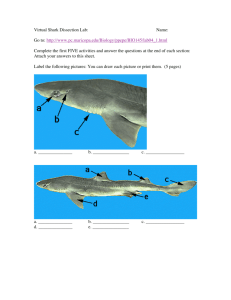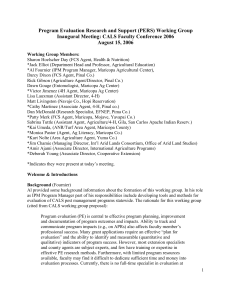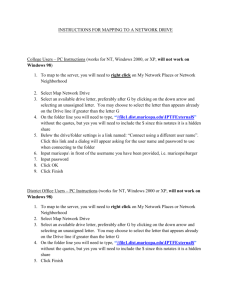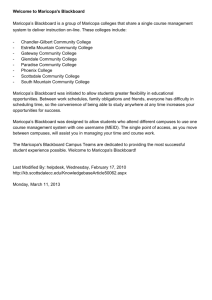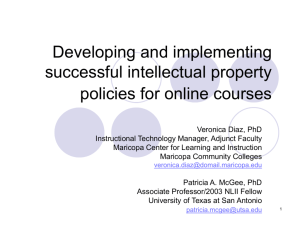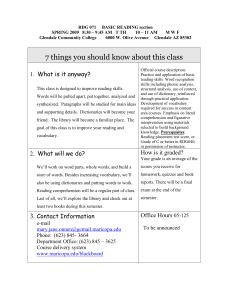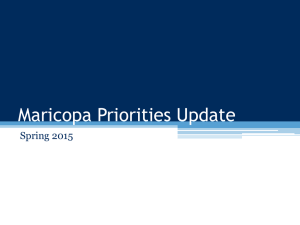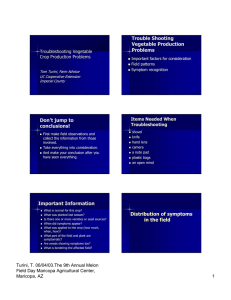Program Evaluation Research and Support Working Group 2008 Submitted by:
advertisement
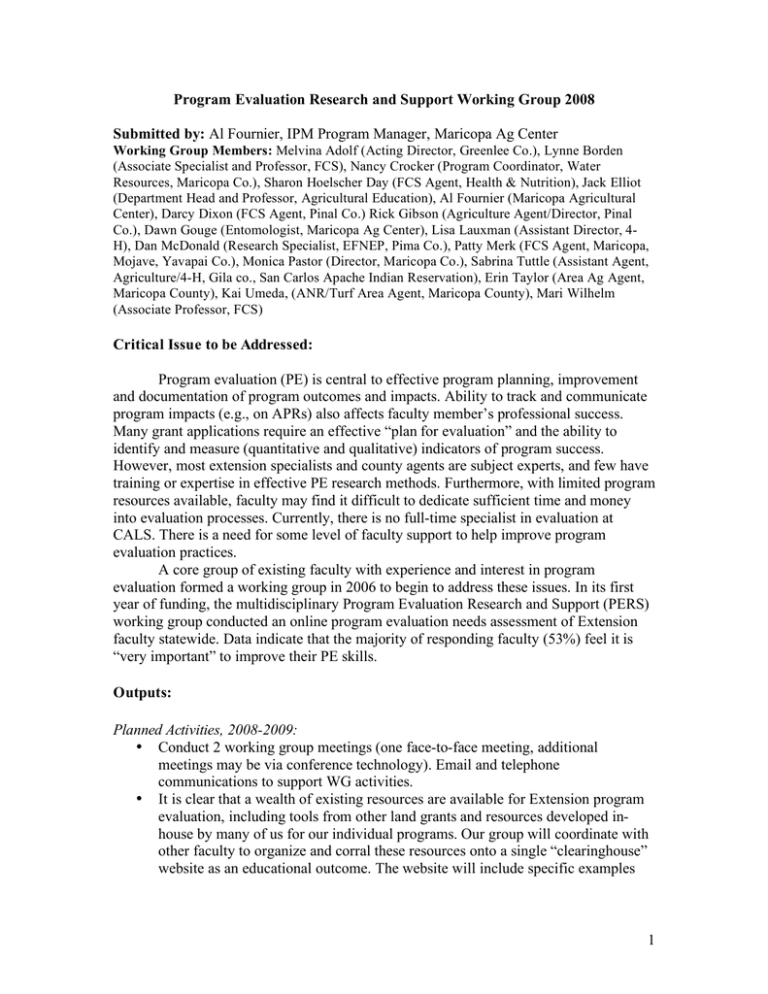
Program Evaluation Research and Support Working Group 2008 Submitted by: Al Fournier, IPM Program Manager, Maricopa Ag Center Working Group Members: Melvina Adolf (Acting Director, Greenlee Co.), Lynne Borden (Associate Specialist and Professor, FCS), Nancy Crocker (Program Coordinator, Water Resources, Maricopa Co.), Sharon Hoelscher Day (FCS Agent, Health & Nutrition), Jack Elliot (Department Head and Professor, Agricultural Education), Al Fournier (Maricopa Agricultural Center), Darcy Dixon (FCS Agent, Pinal Co.) Rick Gibson (Agriculture Agent/Director, Pinal Co.), Dawn Gouge (Entomologist, Maricopa Ag Center), Lisa Lauxman (Assistant Director, 4H), Dan McDonald (Research Specialist, EFNEP, Pima Co.), Patty Merk (FCS Agent, Maricopa, Mojave, Yavapai Co.), Monica Pastor (Director, Maricopa Co.), Sabrina Tuttle (Assistant Agent, Agriculture/4-H, Gila co., San Carlos Apache Indian Reservation), Erin Taylor (Area Ag Agent, Maricopa County), Kai Umeda, (ANR/Turf Area Agent, Maricopa County), Mari Wilhelm (Associate Professor, FCS) Critical Issue to be Addressed: Program evaluation (PE) is central to effective program planning, improvement and documentation of program outcomes and impacts. Ability to track and communicate program impacts (e.g., on APRs) also affects faculty member’s professional success. Many grant applications require an effective “plan for evaluation” and the ability to identify and measure (quantitative and qualitative) indicators of program success. However, most extension specialists and county agents are subject experts, and few have training or expertise in effective PE research methods. Furthermore, with limited program resources available, faculty may find it difficult to dedicate sufficient time and money into evaluation processes. Currently, there is no full-time specialist in evaluation at CALS. There is a need for some level of faculty support to help improve program evaluation practices. A core group of existing faculty with experience and interest in program evaluation formed a working group in 2006 to begin to address these issues. In its first year of funding, the multidisciplinary Program Evaluation Research and Support (PERS) working group conducted an online program evaluation needs assessment of Extension faculty statewide. Data indicate that the majority of responding faculty (53%) feel it is “very important” to improve their PE skills. Outputs: Planned Activities, 2008-2009: • Conduct 2 working group meetings (one face-to-face meeting, additional meetings may be via conference technology). Email and telephone communications to support WG activities. • It is clear that a wealth of existing resources are available for Extension program evaluation, including tools from other land grants and resources developed inhouse by many of us for our individual programs. Our group will coordinate with other faculty to organize and corral these resources onto a single “clearinghouse” website as an educational outcome. The website will include specific examples 1 • • from our own faculty as well as links to nationally recognized needs assessment and evaluation resources. The group will further discuss strategies for increasing faculty awareness of program evaluation and strategies for supporting these efforts. We will continue to communicate and partner with Professional Development Working Group as needed to ensure complimentary function and no duplication of efforts. Participation: The initial target audience for our efforts is CALS Extension faculty, including campus and county faculty working in all departments and disciplines. Ultimately, program participants and other stakeholders will benefit from program improvements. Outcomes - Impacts: Short-term (this year): • Tools and resources for effective program evaluation will be evaluated by the PERS WG and other faculty and made available to faculty by posting them on a single website. • Increased faculty awareness of PE benefits and of the working group as a resource to support PE efforts; this will occur as a result of communications from our group about our activities and resources (as developed). • Enhanced collaboration between campus and county faculty on issues related to PE. • Opportunities for working group members to share ideas and serve as a “sounding board” for program evaluation design and implementation issues. Medium-term (year 2-3): • Availability of PE tools/templates and resources and their use by faculty will help increase the frequency, quality, and usefulness of program evaluation and help generate measurable outcomes and impacts. • Educational activity will enhance faculty skill in PE and improve documentation & communication of program outcomes and impacts. Long-term: (year 3-5) Better documentation of program outcomes and impacts will yield many benefits to faculty: • Data to improve program planning and implementation, as well as stakeholder input on future program needs. • Improved program measurement will increase faculty opportunities to publish their work. • Through a better understanding of evaluation principles and methods, grant writing will be improved, leading to additional opportunities for extramural funding. 2 • Outcomes communicated to the general public, stakeholders and legislators will help improve university relations and increase potential for future funding. Benefits to others: • Clientele will benefit from improved programs. • Improved documentation will aid CALS administrators and program leaders in federal reporting. Inputs/Budget: • Time and energy of working group members, and of specialists and agents participating in needs assessment and otherwise providing input to the working group. • $900 in working group funds is requested to support WG meetings (travel and logistics), professional develop opportunities and other potential expenses related to desired outcomes. Plan for Evaluation: A report will be generated following our next year as an active working group. The report will include a summary of working group activities and outcomes from educational outputs. Report on 2007-2008 Activities and Outcomes • • • • Based on the online faculty needs assessment we conducted last year, members of this work group provided input into planning for the 2008 Professional Development In-Service held April 1-2 in Tucson. We also conducted and summarized the evaluation for that training, which was highly rated by participants. The training included a very well received session on assessing educational outcomes. Conducted two working group meetings (Feb 2008 and May 2008), one in person and one via conference call. Members of the Program Evaluation working group (including Lisa Lauxman, Al Fournier and others) regularly interact as members of the Professional Development working group. This connection between our groups has facilitated appropriate interactions and collaborations on projects (such as the 2008 Professional Development In-Service) and ensured no duplication of efforts. The working group developed a DRAFT for a program evaluation resource website that is temporarily being hosted on the Arizona Pest Management Center website (http://cals.arizona.edu/apmc/evaluation.html), but which will likely migrate to the main Extension website in the coming year. The goal of this website, as stated in last year’s proposal, is to provide easy access to a wealth of existing resources are available for Extension program evaluation, including tools from other land grants and resources developed in-house by many of us for our 3 • individual programs. The draft site is currently being reviewed by working group members and others and will move forward to completion in the coming year. Members of our working group were called in to consult with the Renewable Resources Extension Act (RREA) committee, which has a goal of developing templates for evaluation across Natural Resources extension programming, and has some funds dedicated to this. An outcome of this meeting was the idea that whatever resources are developed should be made available to all of Extension faculty and designed in a way to be of use to all. The draft website described above will serve as a starting point for further development of these resources, which will be a joint effort of this working group and a committee being formed by RREA. 4
